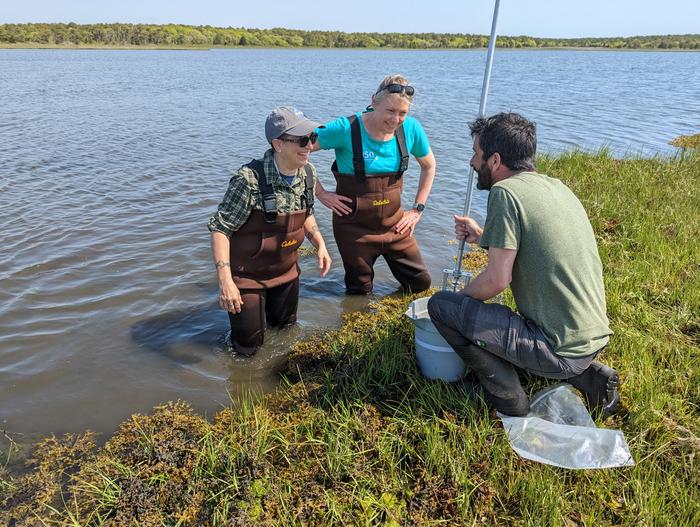WOODS HOLE, Massachusetts – The Logan Science Journalism Program at the Marine Biological Laboratory (MBL) is celebrating its 38th year by welcoming twelve exceptional science and health journalists into its prestigious fellowship. This intensive program offers a unique opportunity for journalists to engage in hands-on research while gaining invaluable insights into the scientific process. The recent cohort, comprised of individuals from diverse backgrounds, will delve deeply into the realms of biomedical and environmental science from May 18 to 28.
The need for informed science journalism has never been more crucial. In a world where misinformation can spread rapidly, the role of journalists in accurately reporting scientific findings and conveying their implications to the public is indispensable. The Logan Science Journalism Program aims to equip journalists with the knowledge and skills to navigate complex scientific concepts effectively. Through immersive experiences and collaboration with leading scientists, these fellows are poised to enhance the quality of science communication in their stories.
Journalists participating in the Biomedical course will explore fundamental techniques that underpin modern biomedical research. The curriculum is designed to provide them with hands-on experience in cutting-edge technologies such as CRISPR/Cas9 gene editing, microbiome imaging, and DNA analysis. By engaging directly with these methodologies, fellows will develop a deeper understanding of the scientific concepts that will enhance their reporting capabilities.
Similarly, the Environmental course will immerse fellows in field research at various ecosystems on Cape Cod, including barrier beaches and salt marshes. This practical approach allows fellows to personally witness the effects of environmental factors such as nitrogen pollution on coastal habitats. The program promotes a holistic understanding of the interactions between human activities and ecological integrity, vital knowledge for effective environmental reporting.
This year’s cohort includes a diverse array of professionals, from reporters at renowned publications to independent journalists with significant experience. Biomedical fellows include Aryn Elizabeth Baker from The New York Times in Rome and Ed Cara, a health reporter for Gizmodo, among others. These journalists will have the opportunity to engage with faculty members, contributing to a collaborative learning environment that encourages dialogue and innovation.
On the environmental side, the program welcomes talented journalists such as Ana Bueno, an environmental reporter from Univision 45, and Georgia Grace Krause, a documentary filmmaker based in Seattle. Each of these fellows brings unique perspectives and experience to the fellowship, enabling cross-disciplinary discussions that often yield fresh insights into contemporary scientific issues.
Throughout the program, fellows will not only learn from scientists but also actively participate in research. Each fellow will gather, analyze, and interpret data before presenting their findings at a mini-symposium at the end of the fellowship. This experience not only reinforces the research skills acquired during the program but also allows fellows to refine their abilities to convey complex scientific narratives effectively to the public.
The Logan Science Journalism Program has developed a reputation for its commitment to rigorous educational standards and its focus on current scientific challenges. Alumni of the program include notable journalists from various esteemed news outlets, including The Wall Street Journal and National Public Radio. This legacy of excellence reflects the program’s enduring impact on both journalism and public understanding of science.
Moreover, the training provided through the Logan fellowship is designed to be adaptive. As the scientific landscape evolves, so too does the curriculum. Program directors and faculty continuously assess and update course content, ensuring that fellows receive education relevant to the latest advancements in science and technology.
Scientific innovation often intersects with societal issues, and the Logan program recognizes this integration. It emphasizes the importance of storytelling in science journalism, enabling fellows to contextualize their findings within broader societal frameworks. This approach helps journalists convey the implications of scientific research in a way that resonates with diverse audiences.
The support framework for this fellowship is robust, with backing from institutions like the Howard Hughes Medical Institute, emphasizing the collaborative nature of scientific advancement. This support not only enriches the fellows’ experience but also signifies a broader commitment within the scientific community to enhance the quality of science journalism.
As the program progresses, the fellows will experience firsthand the vibrant scientific community in Woods Hole, a hub for research and innovation. Engaging with seasoned scientists and peers from varying fields will facilitate fruitful discussions that extend beyond traditional boundaries, promoting a multidisciplinary approach to problem-solving.
In conclusion, the Logan Science Journalism Program serves as a catalyst for elevating the caliber of science communication. By providing journalists with the tools, experiences, and knowledge they need to report effectively, the program engenders a new wave of informed and impactful science journalism. The 2023 fellows, with their diverse backgrounds and keen insights, are well-positioned to lead this transformative effort, ensuring that the essential narratives of science are told with accuracy and clarity.
Subject of Research: Science journalism education and training
Article Title: Twelve New Fellows Awarded in the Logan Science Journalism Program
News Publication Date: [Insert Publication Date]
Web References: [Insert Relevant Links]
References: [Insert Any Relevant Sources]
Image Credits: MBL Logan Science Journalism Program
Keywords: Science journalism, Marine Biological Laboratory, immersive learning, biomedical research, environmental science, CRISPR/Cas9, journalism training, media communication, scientific discovery, Woods Hole, academic fellowship, misinformation in science.




